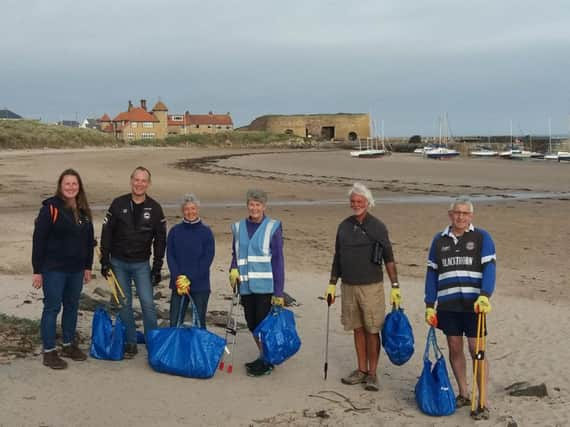GET DRASTIC WITH PLASTIC: Turning the tide on beach litter in Northumberland


More than 800 volunteers have spent over 5,000 hours out on the beaches of the Northumberland Coast Area of Outstanding Natural Beauty (AONB) over the last year counting and collecting the litter they find.
The coordinated litter-counts were organised by the volunteering initiative Coast Care and took place in winter, spring, summer and autumn on nearly every beach in the AONB. The data has been analysed and a report on the amount and type of litter on our beaches has been issued today.
Advertisement
Hide AdAdvertisement
Hide AdThe Marine Conservation Society have also released the data from their national survey today which shows that, in comparison to the national picture, the beaches in the AONB are some of the cleanest in the country with an average of 59 litter items per 100 metres compared to a national figure of 600 items.
The 2017/18 survey attempted to replicate a similar survey carried out in 2007 using the same methodology. In 2007 there was an average of 8.17 items per metre compared to 5.9 items today. Although there were differences in effort, the actual beaches surveyed and the categorisation of litter items, this is still a significant decrease. Anecdotal evidence would suggest that more volunteers are collecting litter, there is greater public awareness of the issues, the plastic bag tax and investment in sewage treatment facilities have all helped.
Coun Jeff Watson, chairman of the Northumberland Coast AONB said "Firstly, I must thank the hundreds of volunteers who have contributed to the survey and the many more who collect litter from our beaches every day.
“Although there has been a reduction in the amount of litter on the beach since 2007, we mustn’t think we’ve solved the problem. Collecting litter on the beach has become an increasingly popular activity that makes our beaches appear cleaner than would otherwise be. We must all work together to stop litter, especially plastics, from getting into the sea and onto our beaches in the first place.
Advertisement
Hide AdAdvertisement
Hide Ad“We need to continue to raise awareness of the problems caused by litter to our environment and not just at the coast. During 2019, the AONB Partnership we will work with our tourism businesses, the statutory organisations and our volunteers on campaigns and activities to reduce the amount of litter ending up in the sea.”
The Local Environmental Action Fund (LEAF) is a ground-breaking partnership between the Community Foundation, Shears Foundation, Greggs Foundation and individual and corporate donors. LEAF awards small grants for work that has a positive impact on the environment while improving the quality of life in communities. The project was funded by a LEAF grant, made possible through a donation by Newcastle-based Muckle LLP, a leading independent commercial law firm that donates the cost of any carbon emissions it produces to LEAF each year.
Andrew Davison OBE, Partner at Muckle LLP, said: “It’s fantastic to hear the beaches of Northumberland are some of the cleanest in the country, but any amount of litter on the beach is too much. Muckle is incredibly passionate about the North East environment in particular, so we are delighted to have supported this project, which is not only tackling the causes of coastal litter in our region, but also challenging all of us to question our approach to recycling, single-use plastics and waste in general.”
Katie Wellstead, principal advisor at Community Foundation said: “We are delighted to have been able to support this project through the Local Environmental Action Fund. The Community Foundation matches generous people to important causes. The data that has been collected by volunteers on marine litter on the Northumberland Coast is fascinating, but
Advertisement
Hide AdAdvertisement
Hide Adalso provides vital information which will assist in tackling the important issue of marine litter in our area in the longer term.”
The report includes an action plan for 2019 to try to tackle litter at source, before it gets into the sea. Actions include:
● A social-media campaign in the summer of 2019
● Information about how to reduce use of single-use plastics in the AONB Visitor Guide
● Provide information about beach litter for bedroom browsers/welcome packs in hotels, B&Bs, caravan parks and self-catering premises
Advertisement
Hide AdAdvertisement
Hide Ad● Encourage the operators of self-catering accommodation premises to provide reusable mugs for use whilst people are staying, to reduce the use of single-use cups
● Work with Northumbrian Water, on a coast-themed campaign, to encourage the ‘3P’s’ message
● Work with Northumberland Inshore Fisheries Conservation Authority (NIFCA) to scope out a ‘fishing for litter’ type project to include awareness raising with fishers and an audit of port/harbour waste reception facilities
● Encourage volunteer beach-cleaners to report pot-tags to NIFCA
● Provide funding and support for community litter groups
● Maintain beach-litter hubs at five locations in the AONB
Advertisement
Hide AdAdvertisement
Hide Ad● Promote opportunities to volunteer with Coast Care to local people and visitors
The report breaks down the litter by type and by source as well as providing the figures for each of the individual beaches surveys. Seasonal variations and a comparison with the 2007 survey are discussed. The report can be downloaded from www.northumberlandcoastaonb.org/beach-litter/